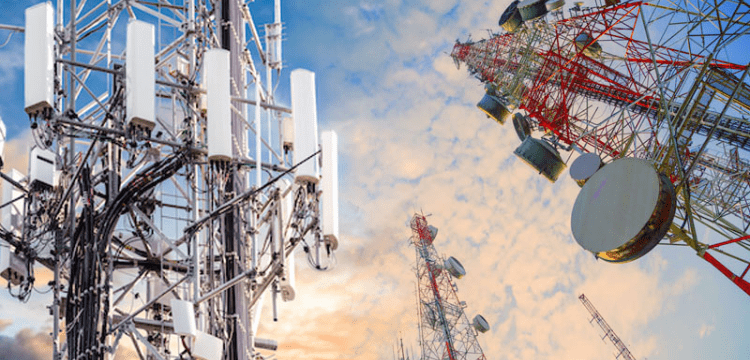[vc_row][vc_column][vc_column_text dp_text_size=”size-4″]Following cabinet approval, the Ministry of Information Technology and Telecommunications (MoITT) plans to launch the Infrastructure Sharing Framework.
This was stated by Member Telecom Omar Malik during a webinar titled “Adopting 5G to Positively Impact the Environment: A Roadmap for Pakistan” held on Wednesday by the Sustainable Development Policy Institute (SDPI).
He also stated that initiatives such as spectrum and infrastructure sharing will be critical in improving connectivity, reducing network disruptions, and lowering environmental impacts. He stated that since 2020, the total deployment of fibre optic in Pakistan has increased from 124,000 km to 190,000 km, citing a study conducted in collaboration with the World Bank that revealed optic fibre penetration as a key barrier. Furthermore, he stated that economic insecurity and consumer affordability are two other challenges impeding the country’s 5G rollout.
Also Read: Pakistan may need to look for alternative funding sources.
In his opening remarks, Brigadier Mohammad Yasin (Retired), Senior Advisor Emeritus, SDPI cited political and economic instability, a higher tax on IT services, a weak fibre optics infrastructure, expensive frequency spectrum, a lack of dollars, and uneconomical smartphone prices as key challenges resulting in declining investor interest, deteriorating IT services, and delaying the launch of 5G in Pakistan.
According to Khalid Khan, Chairman of the Central Asian Cellular Forum, advancements to 3G and 4G have had transformative effects on other sectors such as transportation, fintech, and so on. He emphasised human resources as the most valuable exportable commodity and urged the promotion of competitive engineering skills in order to capitalise on the global IT sector’s potential growth. He urged the government to view supportive policy interventions as part of a larger picture of connectivity rather than as revenue-generating avenues.
Also Read: President Alvi all for paying attention to fastest growing IT industry in Pakistan
Instead of hastening the launch of 5G, Abdul Rehman Usmani, VP Network, Jazz, emphasised that the best approach is to develop use cases and a sustainable business model to prevent consumers from reverting to 4G due to limited utility. He emphasised the importance of creating a favourable ecosystem through R&D centers, a regulatory regime, and cost-effective spectrum denominated in PKR.
According to Dr. Fareeha Armughan, Research Fellow at SDPI, 5G will accelerate modern financial services, cloud computing, and AI, with banks already eager to shift to fast, touchless, and easy-to-use financial services over traditional banking. There is no better tool for looping in vulnerable communities in the economy and moving the needle on the full circle of poverty alleviation than combining mobile and financial services.
Aslam Hayat, ICT Regulatory Expert, stated that the adoption of 5G has the potential to improve energy efficiency, catalyse the uptake of renewables, efficient resource management through the promotion of AI, IoT, and the use of sensors, among other things, reduce greenhouse emissions through the adoption of smart technologies, particularly in the transportation sector, and improve air quality.
However, he emphasised that these have drawbacks, such as a sharp increase in electricity demand and consumption, an increase in e-waste load as consumers switch to the latest 5G-enabled devices, and negative consequences for the environment, biodiversity, habitats, and ecosystems due to infrastructure development.
Fawad Sarwar, Solutions Architect at Ericsson Australia, stated that while telecom and IT contribute 1.4 percent of global greenhouse gas emissions, economic and industrial digitalization will have a 50 percent impact on emissions by 2030.
Also Read: SBP scraps 1.5% fee on debit, credit card transactions
He explained how sensors, artificial intelligence, and IoT-enabled systems can be used to reduce emissions from the construction and transportation sectors. He emphasised a three-pronged approach of sustainable network evolution, network expansion and modernization, and intelligent network operation to break the energy curve and reduce environmental footprint.
According to Maryam Shabbir Abbasi, Research Coordinator at the University of Vermont, developed countries offer emission reduction success stories achieved through the implementation of 5 G-enabled technologies in industries. She emphasised the importance of 5G in improving early warning systems, connectivity, intelligence, and information dissemination during natural disasters such as the recent floods.
In his closing remarks, Dr. Abid Qaiyum Suleri, Executive Director of SDPI, emphasised that the future penetration of 1 trillion interconnected devices will increase lithium consumption by four times and energy demand significantly. To meet energy demand, he emphasised new self-energizing and energy harvesting techniques, as well as capturing electromagnetic waves produced by these interconnected devices via micro-antennas.[/vc_column_text][/vc_column][/vc_row]











